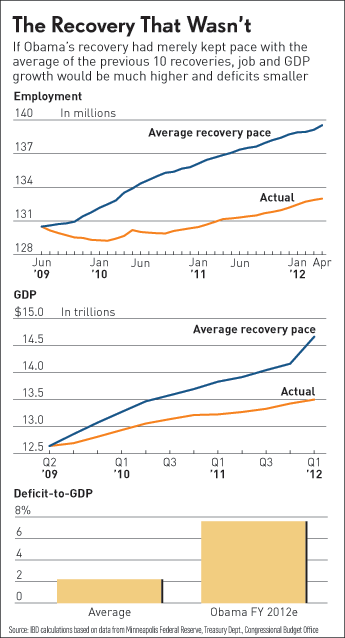Subpar Obama Recovery: 6.5
Million Jobs Below Average
IBDEditorials.com

In his recent speeches on the campaign trail and at official functions, President Obama typically touts the fact that over the past two years, the economy has created more than 4 million new jobs, with more than 1 million in the past six months alone.
At a fundraiser last month, he called this "extraordinary progress."
But the economic recovery that Obama has presided over has been far from extraordinary. It hasn't even been ordinary.
In fact, it's come in well below average on several key indicators compared with the previous 10 economic recoveries, dating back to 1949, according to an IBD analysis of various economic data.
And on several measures, the current recovery — which started five months after Obama took office and is now in its 35th month — is the worst on record since World War II.
Here are the results.
Employment: By this point, the average job growth in the past 10 recoveries was 6.9%. Under Obama, jobs have grown by just 1.9%, according to data from the Minneapolis Federal Reserve.
Had the current recovery kept pace with just the average recovery over the past 60 years, there would be 6.5 million more people with jobs today, and the unemployment rate would be below 7%, instead of above 8%. That assumes several million more Americans would have joined the workforce. If the current anemic labor force were unchanged, those 6.5 million jobs would drive unemployment to 4%.
GDP growth: The Obama recovery has also performed far worse than average when it comes to GDP growth. After 11 quarters, the economy is still only 6.8% bigger than it was when the recession ended. In contrast, GDP was 16% bigger, on average, by this point in the previous 10 recoveries, the Minneapolis Fed data show.
The current recovery is so slow, in fact, that it just barely beats GDP growth 11 quarters after the 1980 recession ended — even though there was the intervening long and painful 1981-82 recession. And unless GDP shoots up in Q2, the current recovery will soon be the absolute worst since the Great Depression.
Had the Obama recovery tracked the average GDP growth in the 10 previous recoveries, the economy would be almost $1.2 trillion bigger today.
Incomes: By the third year of the past five recoveries, real median household incomes climbed an average 2.8%, according to the Census Bureau, which only has household income data back to 1967.
But in the current recovery, real household incomes dropped 5.4% during the recovery, according to Sentier Research, which compiles a monthly household income index using Census data.
"Unlike previous recoveries, we actually saw household incomes drop faster during the recovery than they did during the recession itself," said Gordon Green, who co-founded Sentier.
Deficits: The current recovery also doesn't stack up well when it comes to annual federal deficits. By this point in previous recoveries, deficits were running an average 2.2% of GDP. This year, they're expected to be 7.6%, according to the Congressional Budget Office.
Here's another way to look at it: If the deficit-to-GDP ratio matched the average of the previous recoveries, it would be around $341 billion, instead of $1.2 trillion.
National debt: Although Obama claims that he's cleaning up after the "wild debts" Republicans ran up, the national debt has climbed much faster during Obama's economic recovery than the typical recovery in the past.
On average, federal debt climbed 9.5% in the first three years of those recoveries, after adjusting for inflation. Under Obama, debt has climbed $4 trillion since the recovery started, a 28% increase in real terms.
So what explains today's historically poor economic recovery?
Obama routinely blames the deep recession. The problem is that, historically, the deeper the recession, the stronger the recovery has been.
Others have argued that recoveries from financial crises produce sluggish recoveries. However, a paper published by the Atlanta Fed concluded that U.S. history provides "no support" for linking the current mediocre recovery "with the financial crisis of 2007—2008."
And there are those who argue that the stimulus was insufficient. But that's hard to believe, too, since spending has averaged more than 24% of GDP over the past three years, and deficits averaged 9.3% — higher levels than at any time since World War II.
Obama most recently has argued that Republicans are thwarting the recovery.
"We've got too many of my dear Republican friends in Congress that have been standing in the way of some steps that we could take that would make a difference at the moment," Obama said last week.
But Obama got everything he wanted in terms of economic policy his first two years in office, when he had solid Democratic majorities in the House and Senate, including a massive stimulus, Cash for Clunkers, mortgage aid, Wall Street reform, ObamaCare and so on.
But even Democratic support for Obama's recent economic proposals has been lukewarm. Sen. Joe Manchin III, D-W.Va., for example, said that he had concerns "about the level of spending that President Obama proposed," after Obama outlined a new stimulus plan last fall.
Meanwhile Republicans say they've passed 30 jobs-related bills in the House since 2011 that have been held up in the Senate. One that did get through — the JOBS Act, which eased some financial regulatory burdens on small companies — was sponsored by Republicans, and opposed by more than 60 Democrats in the House and Senate.

